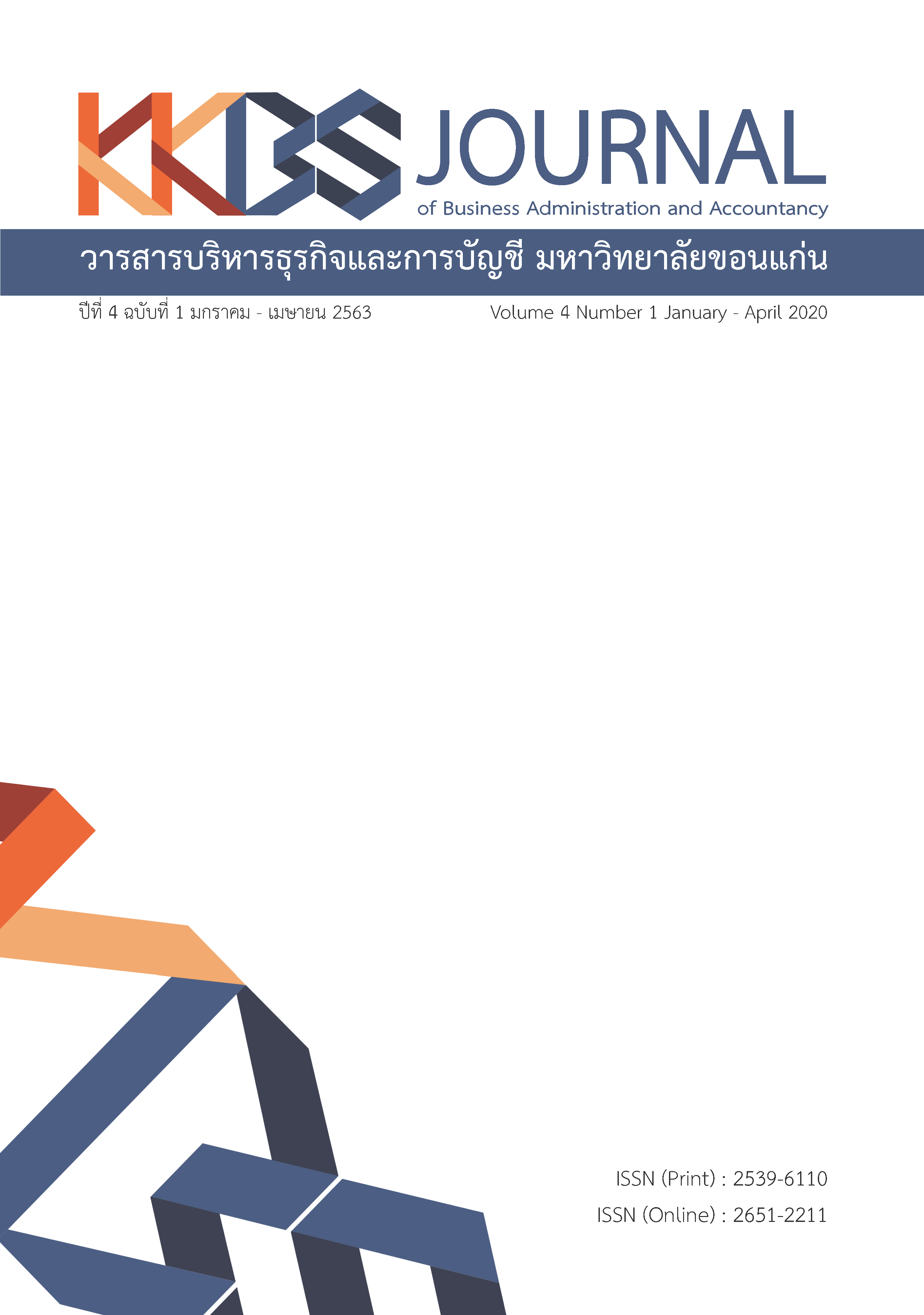Relationships in Organizations that Lead to Smoothly of Teamwork in Thai-Chinese Joint Venture Business in Retail and Wholesale
Main Article Content
Abstract
This research to study, problems and obstacles in the relationship between members in the organization and analyzing the factors that encourage members of the Thai-Chinese joint venture organization with different cultural backgrounds are smoothly to teamwork. The result to the problems of the relationship between the members of the organization is caused by unclear work patterns, different compensation, work that is not timely and often has an excuse, no clear of organizational-structure-responsibilities for teamwork, owners neglect to create corporate culture, do not have set goals, employees feel insecurity in the company and not trusting others to act on their behalf. Obstacle of the relationship between members in the organization is caused by having different cultures and different of languages, causing an incompatibility. The factors to supporting with members of the Thai-Chinese joint venture organization have cultural differences able to work together smoothly due to administrators need to learn culture.
Article Details
The articles published in the journals are the authors' opinions, not the opinion of the editorial team or administrative staff. The articles published is copyright of the Journal of Business Administration and Accounting, Khon Kaen University.
References
Bank of Thailand. (2017). Investment path from China. Retrieved January 6, 2018, from: https://www.bot.or.th/Thai/MonetaryPolicy/ArticleAndResearch/FAQ/FAQ_116.pdf (in Thai)
Barnard, C.I. (1938). The functions of the Executive. 13th ed. Cambridge: Harvard University Press.
Center for ASEAN Studies Thammasat University. (2015). Thailand and being the Center of the ASEAN Economic Community 2. Pathumthani: Thammasat Printing House. (in Thai)
Chandasuwan, P. (2015). The functions of the executive, chapter I. Journal of the Association of Researchers, 20(2), 172-176. (in Thai)
Chantavanich, S. (2019). Qualitative research. Bangkok: Chulalongkorn University Printing House. (in Thai)
Daengthoen, S. (2015). The strategic partner of human resource practitioneers for ASEAN economic community of business organizations in Samutprakan industrial estate. Burapha Journal of Business Managament, 4(1), 6-23.
Denison, D.R. (1990). Corporate culture and organizational effectiveness. New York: Wiley.
Department of Business Development Ministry of Commerce. (2015). Service sector. Retrieved September 6, 2018, from: https://www.dbd.go.th/more_news.php?cid=69 (in Thai)
Harada, Y. (2017). A cultural comparison of business practices in Thailand and Japan with implications for Malaysia. Cogent Social Sciences. 3(1). Retrieved June 22, 2018, from https://www.tandfonline.com/doi/pdf/10.1080/23311886.2017.1370994?needAccess=true
Hofstede, G. (1999). The Universal and the Specific in 21st Century Global Management. Organizational Dynamics, 28(1), 34-44.
Howitt, D. & Cramer, D. (2007). Thematic analysis: research methods in psychology. Retrieved February 25, 2018, from http://wps.pearsoned.co.uk/ema_uk_he_howitt_resmethpsy_2/77/19811/5071812.cw/index.html
Attakraweesunthorn, I. (2018). China online marketing Full. Retrieved June 12, 2018, from https://www.levelupthailand.com/blog/404
Jayakom, N. (2008). Job performance of industrial outstanding employees: A case study. (Master of Education Degree) Bangkok: Srinakharinwirot University. (in Thai)
Juntavong, A. (2018). The influence of organizational justice: the mediating effect of organizational citizenship behavior and perceived organizational support affecting to individual performance: sale represenaive in duty free. Burapha Journal of Business Management, 7(1), 83-99. (in Thai)
Kensupoh, S. (2017). Human Resource training and development. Retrieved September 23, 2018, from ttp://portal5.udru.ac.th/ebook/pdf/upload/186e5h69UCyt5gU3y755.pdf (in Thai)
Lan, Y. (2016). Organizational culture and quality of work life among nurses in tertiary hospitals, Yunnan Province, The People’s Republic of China. Nursing Journal, 43(2), 116-128.
Lin, Y.F. (2017). Demystifying the Chinese economy. Bangkok: Openworlds Publishing House.
Liu, E. & Porter, T. (2010). Culture and KM in China. The Journal of Information and Knowledge Management Systems, 40(3), 326-333.
Meyer, J.P. & Allen, N.J. (1991). A three-component conceptualization of organizational commitment. Human Resource Management Review, 1, 61- 89.
Nartpiriyarat, A. (2017). Organization structure and adaptability of Siam Cement Group (SCG) during 1998-2014. MBA-KKU Journal, 10(1), 59-82. (in Thai)
Nikornpornudom, N. (2016). Cultural works, managerial patterns, and Working processes affecting the quality of employees’ work life of the multinational companies in Bangkok. (Master’s thesis). Bangkok: Bangkok University. (in Thai)
Office of the Education Council. (2017). Report of teachers' competency analysis and measurement and evaluation at the basic education. Retrieved September 25, 2018, from: http://backoffice.onec.go.th/
uploads/Book/1569-file.pdf (in Thai)
Ping, R.Q. & Rong, Y.H. (2013). Research on the cause of China long-term trade surplus and policy proposal. Cross-Cultural Communication, 9(4), 41-44.
Poonpol, P. (2014). Cultural intelligence as an influential factor on cross-cultural adjustment and job performance among expatriates in Thailand. Journal of Research Methodology & Cognitive Science, 12(2), 109-121.
Promta, V. (2014). The study of effects of multinational organization culture on employees’ commitment in multinational company: Case study of multinational company at Jatujak District in Bangkok Metropolis. (Master’s thesis). Bangkok: Srinakharinwirot University. (in Thai)
Rojanawiphat, S. (2015). Education problem solving teamwork of teachers: Case study Tassaban 1 (Bangwua) school Chachoengsao. (Master’s thesis). Chonburi: Burapha University. (in Thai)
Rongklad, W. (2016). The relationships among organizational trust, perceived organizational support and organizational citizenship behavior of employees in Beverage and Food Company. (Master’s thesis). Bangkok: Thammasat University. (in Thai)
Srisuay, N. (2018). The effects of task based learning package on enhancing english speaking skills for hotel of food and beverage staff. Journal of Education Thaksin University, 18(1), 180-190. (in Thai)
Suphonphak, K. (2012). Perception and communication for cultural diversity management of multinational corporations in Thailand. (Master’s thesis). Bangkok: Chulalongkorn University. (in Thai)
Thailand Business Information Center in China. (2018). Thai-Chinese relations. Retrieved March 3, 2018, from: http://www.thaibizchina.com/thaibizchina/th/about-china/relation.php (in Thai)
Waichita, C. (2016). Human relations. Retrieved March 20, 2019, from: https://www.myhr.co.th/csc2016/?page_id=259&lang=th (in Thai)


